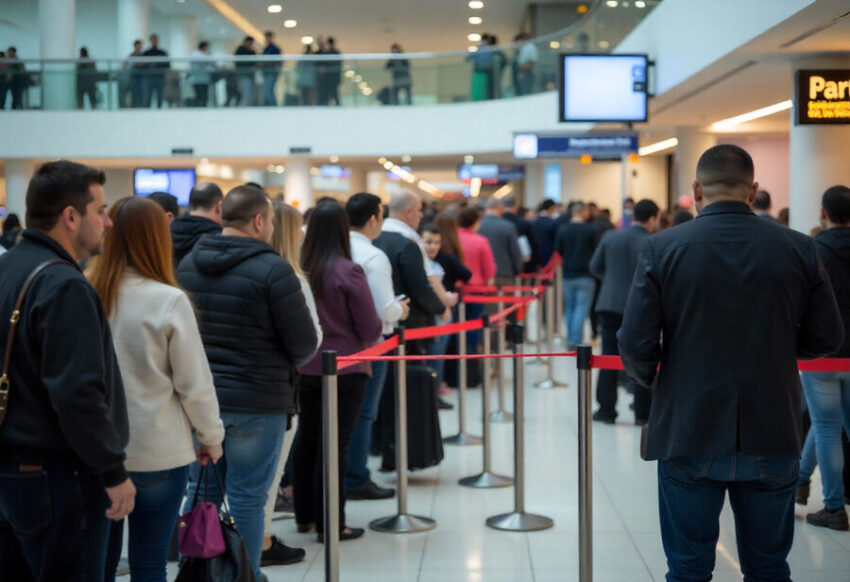Texas Joins Florida, Illinois, California And New York In The Travel Standoff As US Suspends Mexico Flights Amid Accusations Of Air Policy Violations: New Updates You Need To Know
Texas joins Florida, Illinois, California and New York in the travel standoff as the US suspends Mexico flights amid accusations of air policy violations because the Trump administration has moved to enforce tougher aviation rules following what it calls years of unfair treatment toward American carriers and breaches of the 2015 air transport agreement.
Texas joins Florida, Illinois, California and New York in the travel standoff as the US suspends Mexico flights amid accusations of air policy violations because the Trump administration has moved to enforce tougher aviation rules following what it calls years of unfair treatment toward American carriers and breaches of the 2015 air transport agreement. The decision to ground thirteen routes operated by Aeroméxico, Volaris, and Viva Aerobus has set off a wave of travel disruptions across major U.S. states, freezing expansion plans, straining diplomatic ties, and leaving passengers scrambling for alternatives as both nations brace for what could become one of the most significant aviation disputes in North America’s recent history.
The United States and Mexico have entered one of their most serious aviation confrontations in recent years, resulting in the abrupt suspension of thirteen passenger and cargo routes between the two nations. This sweeping move has sent ripples through key American states including Texas, Florida, Illinois, California, and New York — each home to major airports that directly connect to Mexico’s tourism and business hubs. The decision, spearheaded by the Trump administration, marks a turning point in US–Mexico aviation relations, raising concerns among travellers, airlines, and industry experts about the future of cross-border connectivity.
US–Mexico Travel Clash: How the Route Cuts Began
The US Department of Transportation (DOT) announced the cancellation of thirteen existing and planned air routes operated by Mexican carriers between the United States and Mexico’s Felipe Ángeles International Airport (NLU). The directive, unveiled by US Transportation Secretary Sean Duffy, effectively halts both passenger and cargo flights connecting the airport to several American destinations. Duffy said the decision followed repeated disputes over what the US government described as breaches of the 2015 US–Mexico Air Transport Agreement — an accord meant to liberalize and balance aviation access between the two countries.
According to the DOT, Mexico has not been compliant with the agreement since 2022, accusing Mexican authorities of cancelling and freezing US carrier operations unfairly while still allowing Mexican airlines to expand their services to the United States. The department cited slot cancellations, forced relocation of US all-cargo flights, and unequal route approvals as key points of contention.
Thirteen Routes Grounded
The order has a sweeping effect on Mexico’s largest airlines — Aeroméxico, Volaris, and Viva Aerobus — with Viva Aerobus taking the hardest hit. The low-cost carrier will lose routes that connected Felipe Ángeles International Airport, located near Mexico City, to several major US cities, including:
- Austin and Dallas (Texas)
- Denver (Colorado)
- New York City (New York)
- Chicago (Illinois)
- Los Angeles (California)
- Miami and Orlando (Florida)
For travellers in these regions, particularly those flying between the southern United States and Mexico for leisure or business, the cancellations mean higher fares, longer travel times, and fewer options for direct flights.
Expansion Freeze at Mexico City’s Benito Juárez International Airport
In addition to the immediate route suspensions, the US Transportation Department has frozen all new route expansions by Mexican airlines between Benito Juárez International Airport (MEX) — Mexico City’s main international gateway — and the United States. This freeze effectively prevents Mexican carriers from adding or modifying US-bound flights from the airport, a measure aimed at restoring “reciprocal fairness” in air operations.
DOT officials argue that the move is not intended as a punishment but rather as enforcement of balance in the bilateral aviation agreement. However, industry analysts have described it as a major setback for air connectivity between the two nations, particularly at a time when US–Mexico travel demand remains at historic highs.
The Backstory: Long-Brewing Policy Frictions
The roots of this dispute trace back to three years of growing frustration within the US aviation sector. American carriers accused Mexican regulators of stonewalling US flight approvals and limiting access to key Mexican airports, even as Mexico’s airlines expanded freely across the border. According to Secretary Duffy, the Mexican government “cancelled or froze” American flight operations without consequences while continuing to authorize new Mexican services to US destinations.
This imbalance, the DOT claims, violates the spirit of open skies that both nations committed to under the 2015 aviation pact. The United States has long pushed for Mexico to create a more transparent slot allocation system and end preferential treatment that disadvantages foreign carriers.
Broader Enforcement: Part of a Global Aviation Crackdown
Duffy’s order aligns with a broader Trump administration push to tighten enforcement of international agreements, especially those affecting American industries. Similar actions have reportedly been considered against several European countries over airport noise restrictions and operational limits that the US deems discriminatory toward American carriers.
By acting decisively against Mexico, the US government signals that it will no longer tolerate what it views as “one-sided” aviation arrangements. While such measures are intended to protect domestic airlines, they risk diplomatic strain with major trade and travel partners — particularly one as economically intertwined as Mexico.
Viva Aerobus Hit Hardest
Among all carriers, Viva Aerobus bears the heaviest losses. The ultra-low-cost airline had been aggressively expanding from Felipe Ángeles International Airport, marketing itself as a more affordable alternative to Aeroméxico and Volaris. The now-suspended routes included plans to connect lesser-served US airports directly to Mexico’s capital region, offering cheaper travel options for both tourists and migrant workers.
With these cancellations, Viva Aerobus loses a significant growth avenue, while passengers lose a set of budget-friendly links between Texas, Florida, Illinois, California, and New York — five states that collectively account for millions of annual trips to Mexico.
Impact on Travellers and Tourism
The route cuts will not only inconvenience travellers but may also disrupt tourism flows between the two nations. The United States is Mexico’s largest tourism source market, with millions of leisure and business travellers crossing the border annually. States like Texas and California serve as crucial gateways for Mexican visitors heading north, while Florida and New York attract Mexican tourists seeking leisure, shopping, and family visits.
For American travellers, particularly those in Texas, Florida, Illinois, California, and New York, the suspension means fewer flight choices and potentially higher ticket prices as capacity shrinks. The US government has advised affected passengers to contact their airlines for rebooking or refunds, though the uncertainty has already caused confusion among travellers.
US Proposes Cargo Restrictions
Adding to the tension, the DOT has proposed barring Mexican passenger airlines from carrying air cargo between US and Mexican airports. While this proposal has not yet been finalized, it would severely limit trade flexibility, especially for airlines that rely on mixed passenger–cargo models to remain profitable.
Cargo carried in the belly of passenger planes — known as belly cargo — plays a vital role in cross-border trade, moving goods like auto parts, electronics, and perishables between the two countries. If implemented, this restriction could affect both logistics costs and delivery times for key industries.
Mexico’s Response: Calls for Dialogue
Mexico’s government has reacted strongly to the US action. President Claudia Sheinbaum criticized the move as “unilateral and excessive,” calling for diplomatic discussions to resolve the issue. Mexican aviation authorities argue that their policies are compliant with international standards and that the US is overstepping in applying punitive restrictions.
Industry observers, however, note that the dispute is symptomatic of broader tensions between Washington and Mexico City — encompassing not only aviation but also trade, border management, and regulatory coordination.
How States Like Texas and Florida Are Impacted
For Texas, which shares a deep economic and cultural bond with Mexico, the route cancellations are especially disruptive. The Dallas–Fort Worth and Austin routes were among the most active connections for business travellers and visiting families. Similarly, Florida’s Miami and Orlando airports, which receive substantial inbound traffic from Mexican leisure travellers, will experience a reduction in service capacity.
In Illinois, particularly Chicago’s O’Hare International Airport, cancellations are expected to affect both passenger travel and cargo operations. California, a hub for Mexican-American communities, faces a direct hit at Los Angeles International Airport, while New York, home to significant cross-border business and tourism, loses vital air links to Mexico City’s newer airport.
The Broader Picture: Travel and Diplomacy Intertwined
The suspension of routes between the US and Mexico underscores how deeply aviation ties are intertwined with diplomatic and trade relations. Air connectivity not only moves people but also fuels commerce, investment, and cultural exchange. Any disruption of this scale has cascading effects — from reduced tourism spending to strained bilateral relations.
Experts suggest that both nations must return to the negotiation table to modernize their aviation framework, ensuring that open access, fairness, and regulatory transparency are maintained.
What’s Next for Travellers
For now, American travellers affected by the new order are urged to stay informed, check airline updates frequently, and rebook alternative flights where possible. Some may find rerouted connections via Mexico City’s main airport or other hubs, but schedules and prices are expected to fluctuate.
Texas joins Florida, Illinois, California and New York in the travel standoff as the US suspends Mexico flights amid accusations of air policy violations because Washington claims Mexico failed to uphold fair aviation practices under the 2015 air transport deal. This sweeping move has disrupted thirteen routes, affecting major airlines and travellers across both nations while intensifying diplomatic and industry tensions between the US and Mexico.
The coming weeks will be crucial in determining whether the US and Mexico can find a diplomatic resolution or if this dispute will evolve into a prolonged aviation standoff. As of now, Texas, Florida, Illinois, California, and New York remain at the center of the travel disruption — their airports symbolizing the strained skies between two deeply connected nations.
The post Texas Joins Florida, Illinois, California And New York In The Travel Standoff As US Suspends Mexico Flights Amid Accusations Of Air Policy Violations: New Updates You Need To Know appeared first on Travel and Tour World


